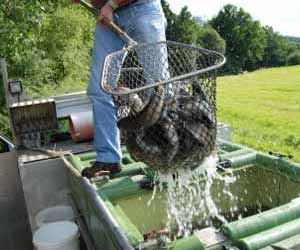On the Job – Fishery Technician Jobs
Roby Adair worked as a fishery technician working at the Barnwell Fisheries District Office in Barnwell, South Carolina. He is originally from Graycourt, South Carolina, and earned an Associate’s Degree from Haywood Community College. He worked for the South Carolina Department of Natural Resources.
My projects vary with the seasons, but I almost always spend about 95 percent of my time out in the field, and only 5 percent of my time in the office. In the spring, I worked on creel surveys. I went out to interview fishermen to see how they were doing, what practices they were using to catch the fish, and asked general questions about what they thought the department could do to improve the fishing. I also recorded the species they were catching and their sizes so that we could see how the fish populations were doing. Now, I’m doing a lot of pond work, recording pH levels and using electro-fishing techniques to temporarily stun the fish so we can record their species and size. I work with a lot of private pond owners, seeing if they need help stocking fish or controlling weeds in their ponds.
I also work on coastal rivers, where salt water fish come to spawn. We tag and survey the fish that come by to see how they’re growing.

After I get a lot of data from the field, we put it into technical reports at the office.
I got started with this work by taking college classes in fishery science and wildlife management techniques, and in more general subjects such as ecology and botany. My college has really strong contacts with the state agencies, and every time I saw a posting for volunteer work with the Department of Natural Resources, I would go and help out. I went on weekends and would skip classes to help with a project if it didn’t interfere with a test. Most of the volunteer work I did was in wildlife management. I worked at deer check stations and helped with quail surveys and wood duck surveys. We also did a lot of restoration work – trapping wild geese or turkeys from an area with a high population and relocating them to an area with a low population. During the whole time, I made sure that my phone number was always at as many of the offices as possible, so that if an opportunity came up, they would contact me.
For other people who want to get positions like this one, I would advise volunteering your time. Any project that comes up will help you to get to know the people in each office that may need someone in the future. The hands-on experience taught me a lot more than any of the classes I’ve taken in college. You also have to be willing to go where the job is – to take the job listing and go there for an interview. People who think they will get a job by reading their books and doing their homework have a much harder time. There are lots of volunteer opportunities, such as helping with fishing competitions for kids and helping the game wardens during hunting season.
Paying jobs usually require some college classes in fish or wildlife management, but most of my training has come on the job. I’ve really learned what it means to work for a government agency, and I think my chances are pretty good of getting a job somewhere in the state or for a federal agency after I finish my degree. The job has given me a lot of experience with speaking with the public and listening to their concerns. It has also given me practice identifying fish species and aquatic plant species. It’s showed me a lot of new places around the state that are pretty different from where I grew up. I’ve always loved the outdoors and I grew up fishing and hunting, so I knew what kind of work I wanted and that helped me to get this position.

